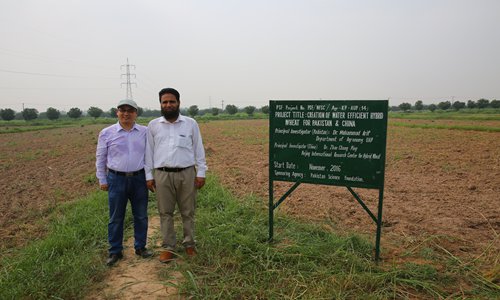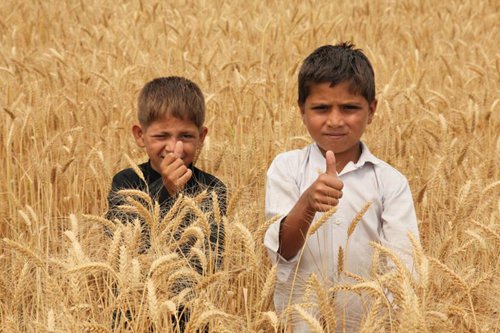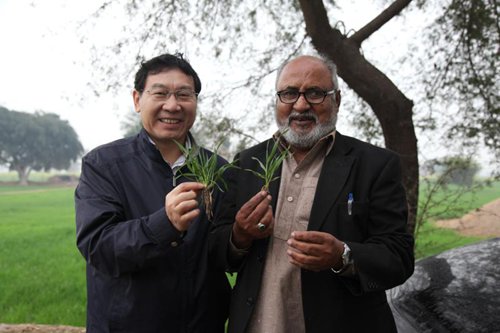Drought, extreme heat post challenge to hybrid wheat: expert
China's hybrid wheat has been successfully grown in pilot areas in Pakistan, and will be introduced into more countries along the routes of the China-proposed Belt and Road initiative soon.

Zhang Shengquan (left), an expert at the Beijing Academy of Agricultural and Forestry Sciences who oversees the hybrid wheat project in Pakistan, visits an experimental field in Pakistan with Muhammad Arif, a professor at University of Agriculture Peshawar. (Photos: courtesy of Zhang Shengquan)
Song Weibo, vice president of Sinochem Group Agriculture Division, China's biggest agricultural inputs company and integrated modern agricultural services operator, told the Global Times on Tuesday that the company's hybrid wheat, using the two-line hybrid technique, has been harvested on a large scale in Pakistan, and is also highly praised in Bangladesh and Uzbekistan.

Children from Pakistan's eastern Punjab Province praise China's hybrid wheat in April 2015.
The company will continue to promote hybrid wheat in other Belt and Road countries and establish demonstration bases in Europe and North America, Song said.

Zhao Changping (left), director of Beijing engineering research center for hybrid wheat, compares the growth of Pakistani wheat and China's hybrid wheat with G.W.Awaisi, former development director of Guard Agricultural Research and Services Company, in Punjab Province in January 2015.
An expert at the Beijing Academy of Agricultural and Forestry Sciences (BAAFS), Zhang Shengquan, who oversees the hybrid wheat project in Pakistan, told the Global Times on Tuesday that wheat production in northern Pakistan increased 50.1 percent between 2017 and 2018, citing data from Pakistan's University of Agriculture Peshawar.
Data from Pakistan-based Guard Agricultural Research and Services Company shows that during the same period, wheat production in the country's middle regions has increased by 45 percent, Zhang said.
Analysts hailed the project as a typical example of China's commitment to transfer advanced technologies and promote regional development in the framework of the Belt and Road initiative.
Providing food security
China is promoting domestically developed hybrid wheat for commercial purposes. The two-line hybrid technique is often used in hybrid rice and wheat. It can increase wheat production by 20 percent.
The technique was developed by BAAFS' Engineering Research Center for Hybrid Wheat in 1992. The hybrid wheat has been proven to outperform standard wheat in terms of yield, water usage and resistance to disease.
Song told the Global Times that Sinochem has sent many experts to Pakistan to teach local farmers how to grow the wheat. "Around 150 experts have been sent to Pakistan, where they visited over 20 cities."
Zhang said that drought and high temperatures are the major challenges to planting hybrid wheat in Pakistan. Frequent changes in Pakistan's governments also make it difficult to sustain the project, he noted.
University of Agriculture Peshawar professor Muhammad Arif told China Radio International that the world has been studying hybrid wheat but no one has achieved China's level of success.
With help from Chinese experts, the technique could yield around 6,000 kilograms per hectare, twice that of local wheat production, Arif said, adding it could free up land for other agriculture products.
Zhao Gancheng, director of the Shanghai Institute for the International Studies Center for Asia-Pacific Studies, said the project could help Pakistan ensure food security and also promote China-Pakistan ties.
"Pakistan's population has been rapidly increasing, but the country is short on farmland. The project is win-win cooperation," Zhao told the Global Times on Tuesday.
Sinochem said the company has also been promoting hybrid rice technology in Bangladesh since 2015.
In October 2016, the company launched the first overseas development center in Bangladesh and helped the country conquer agriculture obstacles by developing a variety that suits local cultivation conditions and consumption customs.


